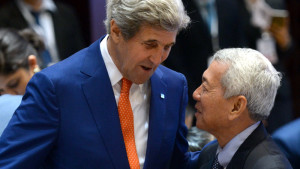LIMA, Peru — A new world order led by China and Russia may be emerging in the Asia-Pacific region but the United States “still is arguably the most powerful nation on Earth,” Foreign Secretary Perfecto Yasay said Thursday.
Speaking to reporters on the sidelines of the Asia-Pacific Economic Cooperation (Apec) ministerial meetings, the country’s top diplomat acknowledged the shift in power dynamics and geopolitics in the region following such developments as President Rodrigo Duterte’s pivot toward Asia and the election of billionaire Donald Trump as the next US president.
But he said such developments did not necessarily mean US influence in the region was waning nor that it would refrain from exercising its influence with Trump taking the helm.
“They have just shifted their priorities, and there have been some responses insofar as the shift of priorities is concerned… The rebalancing has generated some kind of concern but I think America even in spite of changes in the leadership as a result of the recent elections will continue to lead,” Yasay said
“The United States arguably is still the most powerful country, nation, on earth, and it will continue to exercise its influence. I understand that in retaining that influence or the maintenance of the influence will be in pursuit also of its paramount national interest,” he said.
But Yasay said change had indeed come in Asia Pacific, partly as a result of China’s more assertive posture and growing economic might.
“[While] others think that there is geopolitical shift insofar as the national interest of countries are concerned but one point we should not overlook is the fact that this change has always been happening continuously, maybe not perceptibly in some instances in the past but now it is more pronounced,” Yasay said.
Countries like the Philippines have become more conscious about “political realities,” he said.
“So yes, these are changing times, very challenging times and to me, more important than a change in world order as you put it, would be our response in meeting the challenges that this new world order would change or would pose,” Yasay said.
He said such a changed world order did not mean the Philippines would be engaging China or Russia in new military alliances. “But old paradigms will have to change,” he said.
“The change will be along the lines of what Duterte has declared about pursuing an independent foreign policy where national interest is paramount,” Yasay said.
He said he believed Duterte, by making friendly overtures toward Russia and China, was expecting that the Philippines be treated as a “sovereign equal with mutual respect.”
“China and Russia indicated they will precisely just be doing this. They have given assurances that their old aggressive posture in the past is not… what they would like to pursue with us the strengthening of our friendship,” Yasay said. CDG


